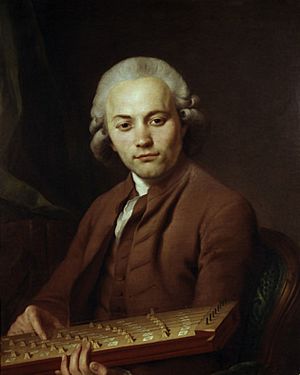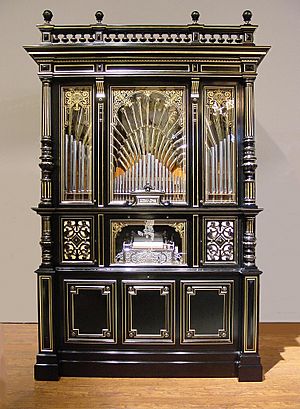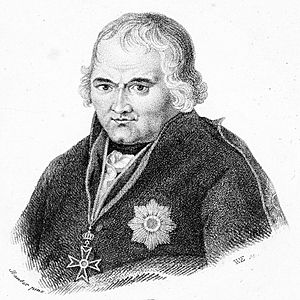Georg Joseph Vogler facts for kids
Georg Joseph Vogler, also known as Abbé Vogler (born June 15, 1749 – died May 6, 1814), was a German composer, organist, teacher, and music thinker. He had a long and exciting career, traveling and working in many countries.
Vogler was known for trying new things in music, especially with the organ. He was a great performer and helped design organs in different cities across Europe. He was also a popular teacher, and famous students like Carl Maria von Weber learned from him.
Some people, like Mozart, didn't always agree with his ideas. But Vogler made many original contributions to music, especially in music history and organ theory. His adventurous life made one historian call him "one of the most bizarre characters in the history of music."
Contents
Biography
Vogler was born in Pleichach, a town in Würzburg, Germany. His father made violins and other musical instruments. Young Vogler studied law and religion at university. But he loved music from a young age and kept studying it.
In the late 1760s, he met Karl Theodor, a powerful ruler. In 1770, Vogler became an assistant at Karl Theodor's court in Mannheim. He started composing and performing music there. In 1771, his first major play with music, Singspiel – Der Kaufmann von Smyrna, was performed.
In 1773, he went to Italy to study music. He learned from Padre Martini and Francesco Antonio Vallotti. He also met Johann Adolph Hasse. Later, in Rome, he became a priest and received special titles from the pope.
Return to Mannheim and New Ideas
When Vogler returned to Mannheim in 1775, he became the court's second music director. He started a music school for both amateur and serious musicians. His students loved him, but his new teaching ideas were different from others. This made him many enemies.
He wrote two important books about music. One was about the theory of harmony, and the other was about voice training. He also invented a new way to play the harpsichord. He also designed a new way to build the organ, making it simpler. He wanted to use "free-reeds" instead of the old "mixtures" in organs.
From 1778 to 1781, he edited a music magazine. It analyzed new music and shared essays on music. Mozart didn't like Vogler's harpsichord fingering, calling it "miserable." Even so, Vogler's ideas influenced many great musicians of his time.
Travels and the Orchestrion
In 1778, Karl Theodor moved his court to Munich. Vogler followed in 1780 but soon left because his plays were not well-received. He went to Paris, where his new music system gained some recognition. His organ concerts in the church of St. Sulpice became very popular. He composed an opera called Le Patriotism for the royal court at Versailles.
Vogler was also famous for his "tone paintings" on the organ. These were musical pieces that described scenes or stories. He played to full houses across Europe in the 1780s.
In 1786, Gustav III of Sweden appointed him as a music director. Vogler then started his second music school in Stockholm. During this time, he composed an opera called Gustav Adolf och Ebba Brahe. He also wrote pieces for the harpsichord and books on music theory.
He became very famous for playing an instrument he invented called the "orchestrion." This was a type of organ. In 1788, he visited Saint Petersburg and met an organ builder who used free reeds. Starting in 1790, Vogler began changing organs by adding new free-reed stops. He rebuilt about 30 organs. In 1790, he brought his orchestrion to London and performed there. His pedal-playing on the organ was especially impressive. His most popular pieces included a fugue based on the Hallelujah Chorus and a musical picture of a storm.
Later Life and Teaching
In 1792, his royal patron was killed. Vogler then began traveling widely. He visited Spain, Greece, Armenia, parts of Asia, Africa, and even Greenland. He was looking for old and pure forms of folk music. These travels also gave him new ideas for his compositions.
He returned to Stockholm and stayed there until 1799. Then he moved back to Germany, where his sacred and dramatic music finally received full praise. He also wrote a book called Choral-System in 1800.
From 1802 to 1804, he lived in Vienna and met famous composers like Haydn and Beethoven. His operas Castore e Polluce and Samori were very popular there. He gained two devoted students: Carl Maria von Weber and Johann Baptist Gänsbacher. Both became well-known composers.
After Vienna, Vogler continued to travel in Germany. In 1807, he received an invitation from Ludwig I, the grand duke of Hesse-Darmstadt. The duke offered him a job as music director with a good salary and a house. This made Vogler decide to stop traveling.
At Darmstadt, he opened his third and most famous music school. His best students there were Gänsbacher, Weber, and Giacomo Meyerbeer. One of Vogler's last trips was to Frankfurt in 1810 to see Weber's opera Sylvana. He continued to work hard on music and organ building until he died suddenly on May 6, 1814, in Darmstadt.
Works
- Gustav Adolf och Ebba Brahe, a Swedish opera
See also
 In Spanish: Georg Joseph Vogler para niños
In Spanish: Georg Joseph Vogler para niños
- Roman numeral analysis
 | Claudette Colvin |
 | Myrlie Evers-Williams |
 | Alberta Odell Jones |




